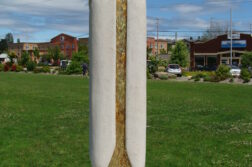Author Questions Basis for Review
To the Editor:
I was disappointed in your review [Nov.-Dec. ’17] of my novel Our Time: San Francisco in the 70s. Your reviewer found my resume more important than his job as a reviewer to comment on the style and content of the novel. Did he read the wrong thing?
I started writing seriously late in life, and this is my first novel, so I wasn’t expecting a glowing review that sent readers racing to the nearest bookstore to read about an exquisitely magical time in our history that changed the way gay men thought about sex. Was the reviewer so uptight about his sexuality that he was afraid to comment on the candidness of all the sex in the novel that was the essence of that era? He ends saying that he would have preferred a nonfiction account. If he’d done his homework, he would have found my memoir Do You Live Around Here?, which recounts my first years as an out gay man.
Chuck Forester, San Francisco
What If Your Professor Is Anti-Gay?
To the Editor:
In his astute critique of the modern mania for procreation and consumption (“Stop Everything! Save the Planet,” Sept.-Oct. 2017), Eric Robertson complained that “people like me cannot say these things” because doing so might make some people uncomfortable. Let me recount an incident from across the Pond that implicated the whole discussion of free speech on campus, trigger warnings, comfort zones, and so on.
At the Times [of London]Higher Education World Academic Summit meeting last September, Vice-Chancellor of Oxford University Louise Richardson revealed that she has “had many conversations with students who say they don’t feel comfortable because their professor has expressed views against homosexuality. And I say, ‘I’m sorry, but my job isn’t to make you feel comfortable. Education is not about being comfortable. I’m interested in making you uncomfortable.’ If you don’t like his views, you challenge them, engage with them, and figure how a smart person can have views like that.”
As someone who has taught students at Oxford and elsewhere, let me say this: it is absolutely not the role of a teacher to make students feel uncomfortable. Prof. Richardson is mistaking the need to challenge students intellectually with making them so distressed that they cannot focus on learning. Of course we should all be able to justify our positions, including the idea that homophobia is bad. Students should be encouraged to analyze ideas they may not agree with, and it’s okay for them to feel out of their depth at times; that this is how we stretch them intellectually.
This pedagogical work should take place in an environment the student is comfortable in. Just as you would not ask a student to take an exam while sitting in icy water, we should not expect students to learn from someone they know holds offensive views. As teachers, we owe a duty of care to our students. As scholars, we have an intellectual obligation to frame ideas and perspectives in historical and social contexts. We can reject homophobia and maintain a high standard of intellectual rigor; we only need to put the emphasis on the student’s ability to understand and argue, all the time respecting the personal identities of the people we are teaching.
Gabriel Schenk, Oxford, England
Correspondences
To the Editor,
Regarding the Nov.-Dec. issue with the theme “100 Years of Subterfuge,” we might consider the following points in relation to several contributors:
- Stephan Likosky [in a piece on early 20th-c. postcards]notes that the French referred to homosexuality as “the German vice,” with many negative connotations. But the British had once described it as “the Italian vice,” sometimes even in a positive sense, because Italians were thought to be generally more relaxed than the English about alternative values.
- Andrew Holleran mentions A. E. Housman’s gay brother Laurence but not his lesbian sister Clemence, while Jeffrey Meyers lists all of Thomas Mann’s lesbian and gay children.
- David LaFontaine writes about the collaboration of four gay men in creating West Side Story. In fact, within the arts world, there have been many such collaborations. For instance, the Met opened its first season at Lincoln Center in 1966 with an opera by Samuel Barber to a libretto by Franco Zeffirelli, also the director and designer, conducted by Thomas Shippers and choreographed by Alvin Ailey, all now known to be homosexual. Benjamin Britten composed operas for his life partner Peter Pears, and he often used the homoerotic themes of “gay” novelists (Herman Melville’s Billy Budd, Thomas Mann’s Death in Venice, and Henry James’ Turn of the Screw).
Despite subterfuge, we are indeed everywhere!
Fr. Paul K. Thomas, Baltimore
Corrections
In the November-December issue, Margaret Cruikshank’s most recent book was given incorrectly. Her latest book is 2017’s Fierce with Reality: Literature and Aging.
In the same issue, in a review of his book, Sex Cultures, Amin Ghaziani’s position at the U. of British Columbia was misstated. He is an associate professor of sociology.



